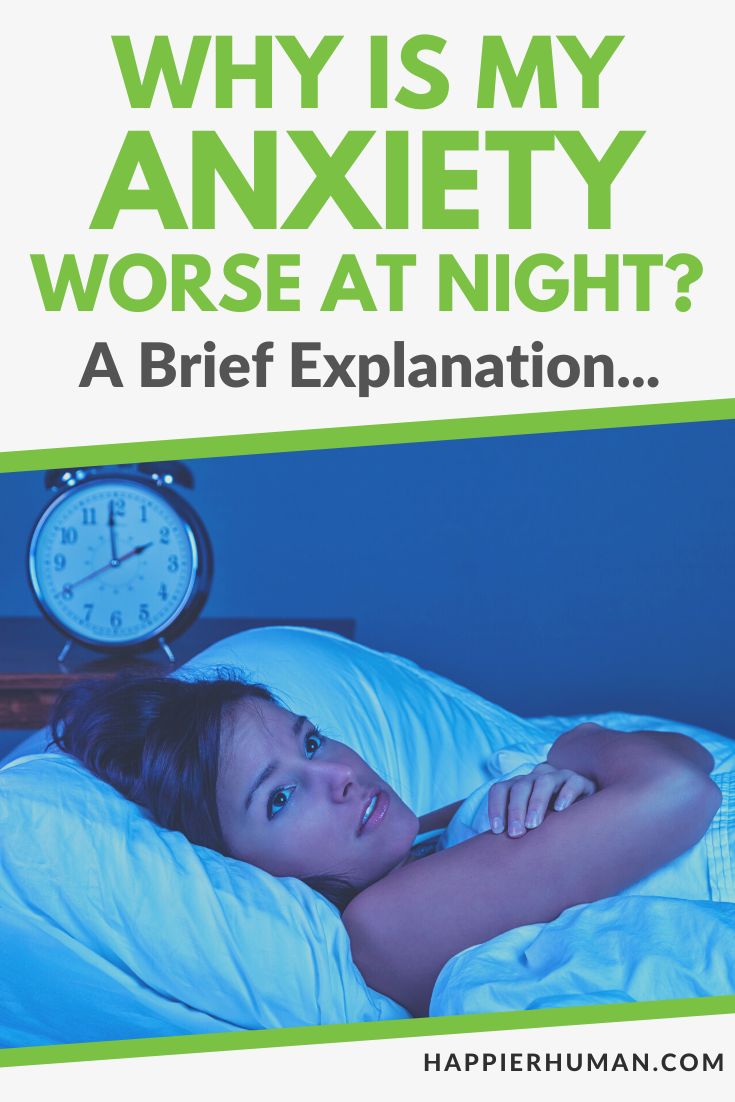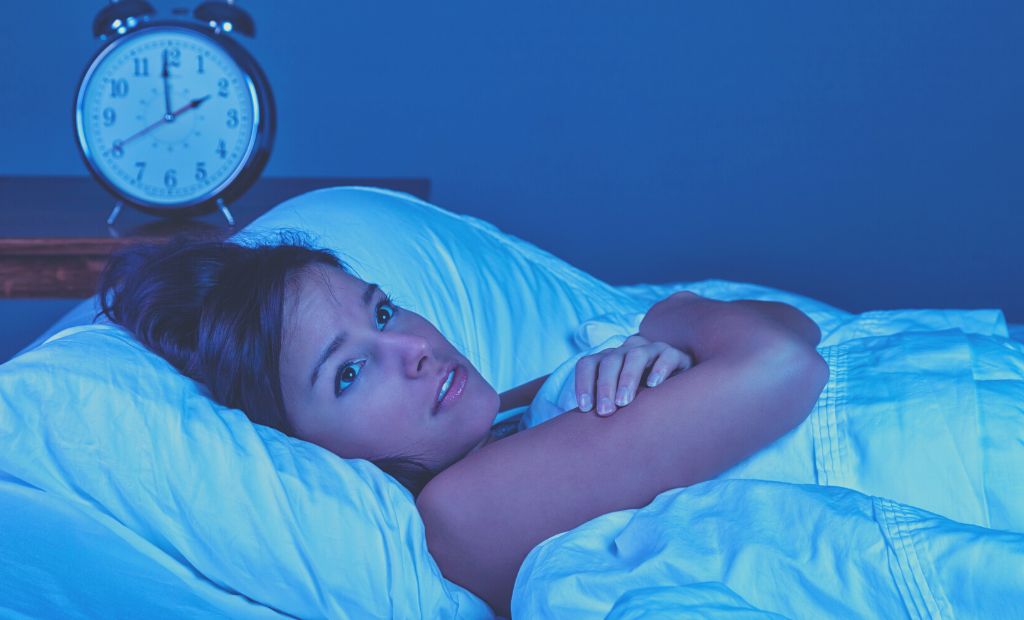Anxiety can impact every aspect of your life. For many people, it can even make it hard to fall asleep at night. Research shows that many people with anxiety also have sleep problems. And unfortunately, it can be even harder to take care of your mental health with the added layer of poor sleep.
If you can relate to this, you may be wondering, why is my anxiety worse at night? And what can I do about it?
Why Is Anxiety Worse At Night?
It’s no secret that sleep is vital to our health. But for people with anxiety, a good night’s rest can be elusive. In fact, a third of adults in the U.S. alone report struggling with insomnia. Anxiety can be a significant component of insomnia symptoms, and yes, it can be worse at night. It’s not unusual to have a difficult time falling asleep or even have panic attacks at night.
This is because if you’re struggling with anxiety, your mind has a harder time shutting off. At night, your body is trying to prepare for sleep by producing melatonin and moving towards a nighttime circadian rhythm. Having anxiety puts your mind at odds with this natural process.
Anxiety happens when your mind dwells in a hyper state of fight-or-flight. This instinct is a vital survival mechanism that everyone has, which is meant to kick in during imminent physical danger. However, anxiety causes you to feel this way all the time, even though the danger isn’t real.
As a result, anxiety can be worse at night when everything is quiet and still. During the day, you may be busy with tasks and surrounded by other people. But at night when the lights go down, it’s harder to shut off your racing thoughts when there’s nothing to distract you from your worries.
To make matters worse, your brain simply may not have the energy to use positive coping mechanisms. At the end of the day, you’re tired and fatigued, making it more challenging to redirect your thoughts.
What Are the Symptoms of Anxiety?
Life can be complicated, and most people worry about things to some degree. So how do you know when what you’re experiencing is anxiety?
Symptoms of anxiety could include a general feeling of unrest, nervousness, or restlessness. You may feel detached, have a hard time concentrating, or even have indigestion. An increased heart rate or skipped beats can also occur. Sweating, hot flashes, or lightheadedness can all be anxiety symptoms.
Nighttime anxiety manifests in similar ways. Since the body and mind are interconnected, you may have both mental and physical symptoms.

Maybe your mind starts racing as soon as your head hits the pillow. Perhaps you get stuck in a loop of negative memories or you can’t stop worrying about the future. You may be unable to stop dwelling on worst-case scenarios, or just feel a slew of difficult emotions. You might even have negative thoughts about yourself. You could experience shaking, sweating, headaches, or even frequent urination.
These could all be symptoms of nighttime anxiety. Not only does anxiety make it harder to fall asleep, but you may have a hard time getting back to sleep if you wake up in the middle of the night.
How Can You Calm Your Mind for a Better Night’s Sleep?
It can be frustrating and exhausting when you’re unable to get a good night’s rest because of anxiety. The good news is, there are many tools you can try to help ease your mind for bedtime.
Cognitive behavioral therapy, medication, or herbal supplements could all be an option to treat anxiety. There are also several simple ways to prepare your mind and body for better sleep, whether or not you have anxiety.
Keeping consistent sleep and wake up times will set your body up for success by aligning you with natural circadian rhythms, helping your brain know when it’s time to rest.
Blue light emanated from screens like your phone or TV is stimulating and tends to keep you awake. When your brain sees blue light, it thinks it’s daytime. So putting down your phone before bed could help you fall asleep more easily.
Try shutting off electronics two hours before you go to bed. Find more calming alternatives to scrolling on your phone, like reading a book or coloring one of our printable adult coloring pages for anxiety.
Affirmations can help reset your thoughts so you can think more positively. Reciting nighttime affirmations before bed could be a powerful part of your bedtime routine, benefitting your mental health and sleep. You could also print out an inspiring quote to keep somewhere visible, like on a bedside table. Here’s a list of helpful quotes for stress and anxiety to give you some ideas.
Grounding can also help you work through anxiety. Grounding is a mindfulness technique that works by pulling you back to the present moment, so you can be fully connected with the here and now and with your surroundings.
Practicing grounding techniques before bed helps you to calm your mind and regain control over racing thoughts. To get grounded, use your five senses. For example, you might hold an object and carefully study it. Or you might eat a healthy snack and drink water slowly before bed, focusing on nothing else. Walking barefoot on the grass while focusing on your in- and out-breath can help you feel rooted and connected to the earth. These are just a few ways to get grounded.
Meditation is another great way to reduce stress and anxiety, stimulate creativity and mental clarity, and promote better sleep. Exercising regularly can also lead to better sleep, as it’s been shown to help you fall asleep faster at night. Exercise contributes to overall general health, which can ultimately improve your sleep.
Final Thoughts on Nighttime Anxiety
If you have anxiety, it can feel like you can’t get your thoughts under control. Intellectually, you may know that what you’re worrying about isn’t an extreme life or death situation, but your mind and body react as if it were. The lack of distractions and fatigue that quiet nighttime brings can exacerbate your anxiety symptoms.
But there are many ways to promote stress relief, soothe anxiety, and promote a better night’s sleep. You don’t need to integrate every technique into your bedtime routine–if it seems overwhelming to try a bunch of new habits, try just one for a week or two until you find what works for you.
For example, you could start by spending ten minutes meditating and ten minutes coloring. Maybe you begin exercising for even twenty minutes in the morning. Or you might shut off your phone, read a book, and have a glass of warm milk and a bedtime snack before you turn off the lights.
The bottom line is, you deserve a good night’s rest. Adding some changes to your bedtime routine can help soothe your anxiety and support healthy sleep.


